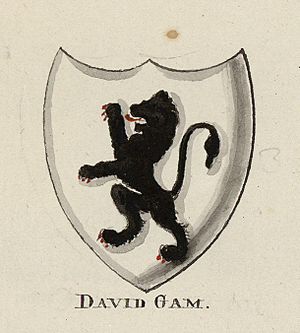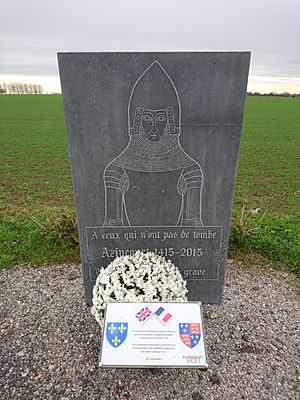Dafydd Gam facts for kids
Dafydd ap Llewelyn ap Hywel (born around 1380 – died October 25, 1415), known best as Dafydd Gam, was a brave Welsh warrior. He was a strong opponent of Owain Glyndŵr, who led a big rebellion in Wales. Dafydd Gam fought for King Henry V of England and died heroically at the famous Battle of Agincourt in France, where the English won a great victory.
The name "Gam" comes from a Welsh word meaning "one-eyed" or "cross-eyed." People traditionally believed that Dafydd Gam had one eye or eyes that looked in different directions. Some Welsh people saw him as a traitor because he fought against Owain Glyndŵr, who is a Welsh national hero. However, in England, Dafydd Gam is seen as a hero. His fame has changed over time, depending on how people felt about Owain Glyndŵr and King Henry V.
Contents
Dafydd Gam's Life Story
His Family Background
Dafydd Gam belonged to a very important Welsh family from the area that is now Breconshire. His family had a long history, tracing their roots back to ancient Welsh kings. His great-great-grandfather, Einion Sais, even fought in famous battles like the Battle of Crecy and the Battle of Poitiers.
Dafydd's family was known for being very loyal to the de Bohun family, who were powerful lords in the region. This loyalty later shifted to Henry Bolingbroke, who married into the de Bohun family. Dafydd's father bought land near Brecon, and it's thought that Dafydd Gam was born there. His family was a great example of a Welsh family that did well by supporting English lords.
Fighting Owain Glyndŵr
Dafydd Gam was a trusted supporter of Henry Bolingbroke, even before Henry became King Henry IV in 1399. When the Owain Glyndŵr rebellion started in 1400, Dafydd Gam and his family stayed loyal to the King. They played a major role in fighting against the rebellion in their area.
Because of their loyalty, Glyndŵr's forces often attacked Dafydd Gam's lands around Brecon, causing a lot of damage. Dafydd Gam was a leader in the big victory against Glyndŵr's men at the Battle of Pwll Melyn in 1405. After this battle, many of Glyndŵr's men were captured or executed, including his son. Dafydd Gam's knowledge of the local area likely helped the King's forces win this and other battles. As a reward for their loyalty, Dafydd's family received some lands that had been taken from Glyndŵr's supporters.
In 1412, Dafydd Gam was captured by Glyndŵr's men. A large sum of money was paid for his release, showing how much King Henry valued him. Glyndŵr made Dafydd promise not to fight against him again. However, after his release, Dafydd told King Henry where Glyndŵr was and continued to fight against him. In response, Glyndŵr's men attacked and burned Dafydd Gam's home in Brecon.
The Battle of Agincourt
Dafydd Gam likely knew King Henry V personally, as Henry had led campaigns against Glyndŵr. Records show that Dafydd Gam fought with archers at the famous Battle of Agincourt in 1415. Many historical accounts mention his death in this battle.
There are many exciting stories about Dafydd Gam's actions at Agincourt. One popular legend says he saved King Henry V's life during the battle. The story claims that a French duke attacked King Henry, even cutting a piece from Henry's crown. Then, a group of Welsh knights, led by Dafydd Gam, stepped in to protect the King. Some of these knights, including Dafydd Gam and his son-in-law Sir Roger Vaughan, were killed while defending Henry. Some tales even say Dafydd Gam killed the French duke himself.
While historians aren't sure if these exact events happened, the story became very popular over time. It was often told by the Tudor period and was believed by many. Even though the details of their deaths are unknown, both Dafydd Gam and Sir Roger Vaughan did die in the battle. Dafydd Gam's bravery was still remembered in the 1800s, with one writer saying he "achieved that glory which will for ever bloom, dying, covered with wounds, on the field of Agincourt after saving the life of the king."
His Family's Legacy
Some of Dafydd Gam's descendants took the last name 'Games' to honor their connection to him. They remained a powerful family in Breconshire for many years. His beautiful daughter, Gwladys ferch Dafydd Gam, known as the Star of Abergavenny, married well twice. Her first husband, Sir Roger Vaughan, also died at Agincourt. Her second husband, Sir William ap Thomas, survived the battle. Their son became the very powerful William Herbert, 1st Earl of Pembroke (1423-1469), and his family later became known as the Herberts, a famous noble name. These important family connections helped keep Dafydd Gam's name celebrated for a long time.
What People Remember About Dafydd Gam
Like his enemy Glyndŵr, many legends and stories grew around Dafydd Gam over time. These tales often came from local traditions and family stories, so their exact truth is hard to know.
One famous story says that Dafydd Gam tried to assassinate Glyndŵr at a meeting in Machynlleth in 1404. According to this legend, when the attempt failed, he was imprisoned in a building called the Royal House, which still stands today. The stories differ on what happened next. Some say Glyndŵr released him soon after, while others claim he was imprisoned for many years. However, his known participation in the Battle of Pwll Melyn in 1405 suggests he couldn't have been imprisoned for too long. These stories, along with poems supposedly written by Glyndŵr himself, show that Dafydd Gam was seen as a major enemy of the rebellion.
The writer George Borrow described Dafydd Gam in his book Wild Wales (1862) as "small of stature and deformed in person, though possessed of great strength. He was very sensitive of injury, though quite as alive to kindness; a thorough-going enemy and a thorough-going friend."
Dafydd Gam is also a key character in John Cowper Powys's novel Owen Glendower (1941).
By the time of the Tudor period, Dafydd Gam was seen as a symbol of a loyal and brave Welshman. He is mentioned briefly in Shakespeare's famous play Henry V. Some historians even suggest that Dafydd Gam might have been the inspiration for Shakespeare's character Fluellen, who is a funny but brave Welsh soldier in the play.
Here's a small part from Shakespeare's Henry V where Fluellen talks about Welshmen:
Fluellen: "If your Majesty is remembered of it, the Welshmen did good service in a garden where leeks did grow, wearing leeks in their Monmouth caps, which your Majesty knows, to this hour is an honourable badge of the service, and I do believe, your Majesty takes no scorn to wear the leek upon Saint Tavy's day."
King Henry: "I wear it for a memorable honour; for I am Welsh, you know, good my countryman."
Local Stories in Monmouthshire
According to local legend, one of Dafydd Gam's homes was a manor house surrounded by a moat at Hen Gwrt, near the village of Llantilio Crossenny in Monmouthshire. Only the moat remains today. He is also remembered in a stained glass window in the Llantilio Crossenny church. The Latin words on the window say: "David Gam, golden haired knight, Lord of the manor of Llantilio Crossenny, killed on the field of Agincourt 1415."
 | Misty Copeland |
 | Raven Wilkinson |
 | Debra Austin |
 | Aesha Ash |



